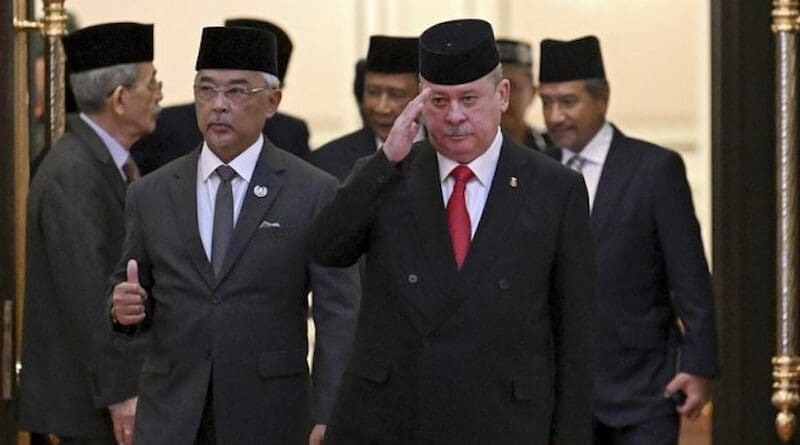Malaysia’s Outspoken Next King May Not Be A Mere Figurehead – Analysis
By BenarNews
By Iman Muttaqin Yusof
The outspoken, sports-car loving ruler of Johor state will next week become Malaysia’s 17th king since independence, after being elected under the country’s unique rotating monarchy.
Sultan Ibrahim Iskandar will ascend the throne on Jan. 31, bringing with him an active leadership style that experts say could help expedite Prime Minister Anwar Ibrahim’s policy reforms, but may create friction with him as well.
Despite the monarchy’s largely ceremonial position in Malaysia, the 65-year-old is likely to continue the more politically active role assumed by the nation’s king in recent years, analysts said.
“Sultan Ibrahim seems to be more hands-on than other rulers, which can be seen in his direct criticisms on certain issues,” Tunku Mohar Mokhtar, an assistant professor at the International Islamic University Malaysia, told BenarNews.
“So far, we see that both the sultan and Anwar agree on at least two important issues: eradication of corruption and reviving the economy. For Anwar, this would provide greater legitimacy for his reform efforts.”
But having two hands-on leaders – the head of state and the head of government – could create tension if they cannot work together, he said.
“It would only work if both understand their limits of power,” Tunku Mohar said.
Since gaining independence from Britain in 1957, Malaysia has embraced a monarchical system in which the king is elected on a rotating basis every five years by the hereditary sultans of nine states.
Sultan Ibrahim will replace Sultan Abdullah Sultan Ahmad Shah, of central Pahang, whose reign coincided with a period of political instability that saw three prime ministers in as many years, and a hung Parliament.
Politically active
Born on Nov. 22, 1958, Sultan Ibrahim will be the second ruler of Johor appointed as Yang di-Pertuan Agong – or Agong – as the king is known.
His father, Sultan Iskandar Sultan Ismail, served as king from 1984-89 and as Johor’s Sultan from 1981 until his death in 2010.
Sultan Ibrahim was educated at home and abroad. Later, he underwent extensive military training, including in the United States, before working in various offices of the Johor state government, ranging from the Treasury to the Forestry Department.
His extensive business interests include stakes in the $100-billionForest City project and internet service provider REDtone International. In 2015, he bought a property worth U.S. $8.5 million (24.21 million ringgit) in the West Australian capital, Perth.
He’s also known to keep a fleet of luxury cars and is the only Malaysian sultan with a private army, which was retained as part of a colonial-era deal with the British.
Johor’s Crown Prince Tunku Ismail Sultan Ibrahim described his father as a staunch supporter of Malaysian interests who was unafraid to intervene in political issues.
“He will be actively involved in maintaining a rapport with the prime minister and providing input, whether or not it is appropriate,” said Tunku Ismail in late October during a podcast hosted by former Health Minister Khairy Jamaluddin.
“The prime minister is going to have a tough time,” he added.
The Malaysian king plays a figurehead role in the Muslim-majority nation and is bound to act on advice from the prime minister.
But the monarch does have special responsibilities and privileges under the Constitution, including the power to appoint a prime minister who has the backing of lawmakers.
“Instead of seeing the constitutional monarch as just a rubber stamp, it’s crucial to understand that executive power, including the PM and cabinet, is still under the Agong’s purview,” constitutional expert Wan Ahmad Fauzi, from Universiti Malaysia Pahang, told BenarNews.
In Nov. 2022, for example, a hung Parliament forced King Abdullah to intervene and appoint Anwar as prime minister.
Political instability also forced him to select Muhyiddin Yassin as the country’s leader in February 2020 and Ismail Sabri Yaakob as prime minister in August 2021.
“The rulers have been forced to play a more proactive role in politics,” said Tunku Mohar of the International Islamic University Malaysia.
Although recent practices suggest this role is within the constitutional limits, he said, it would be better for the royal institution to keep away from politics.
“If there are disputes over the composition of government, [they] should be resolved in the legislature and the monarchy would then simply confirm the legislative decision, in the true spirit of the constitution,” Tunku Mohar said.
‘Wants to stop corruption’
Sultan Ibrahim has already shown his willingness to get involved in Malaysian politics.
Last year, in response to reports that the opposition Perikatan Nasional coalition was trying to oust Anwar by breaking up a historic government alliance between Pakatan Harapan and Barisan Nasional, he issued a strongly-worded statement saying this was detrimental to the nation’s well-being.
“Enough is enough. How much longer must over 30 million people in our country endure this situation? The economy must recover and Malaysia’s prosperity must be prioritized,” he said.
In a December interview, Sultan Ibrahim conveyed his desire for the country’s anti-graft agency and state-owned oil and gas company, Petronas, to report directly to him rather than Parliament.
Anwar was cautious in his response to the comments. The matter could be discussed, but the principles of the Constitution, parliamentary democracy and constitutional monarchy would be defended, he said.
Looking ahead, analysts say the reform-minded nature of both Anwar and Sultan Ibrahim could make for a dynamic partnership.
“It’s going to be interesting because both Anwar and Sultan Ibrahim are unequivocal in expressing their opinions. Anwar, as the country’s executive in his role as prime minister, benefits from it. However, Sultan Ibrahim, being a constitutional monarch, does face limitations,” Azmi Hassan, of the Nusantara Academy for Strategic Research, told BenarNews.
“Despite this constitutional role, Sultan Ibrahim isn’t restrained from sharing his noteworthy opinions on certain sensitive matters,” he said.

